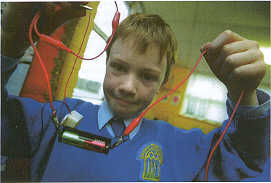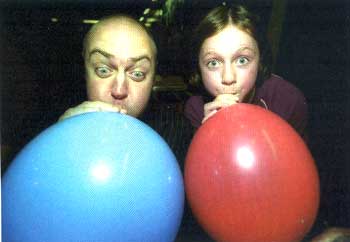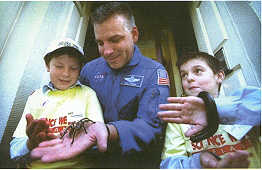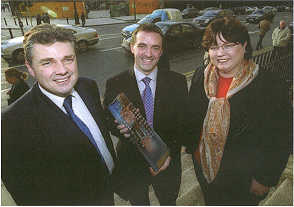| 2003 |

|
YEAR BOOK |
Forf�s - Science, Technology & Innovation Awareness Programme
|
Schoolchildren introduced to the wonders of science through the Science, Technology and Innovation Awareness Programme
|

One of the main objectives of the programme is to introduce young children to science in a way that makes it fun and interesting, and also lays a firm foundation for careers and advancement in the sector in the future. This year has seen an increase in the numbers of students selecting higher level science subjects for their Leaving Cert. While this is certainly welcomed, the STI Awareness Programme recognises the ongoing need for a careful, innovative and enjoyable introduction to science and technology for the nation's young people.
Primary Science Day
A highly successful and pivotal event for primary schoolchildren in 2002 was Primary Science Day, which was jointly sponsored by the Department of Education & Science and the STI Awareness Programme. Held on the 3rd of December last year, Primary Science Day enabled primary school students all over Ireland to devote time to practical science activities in an exciting and fun way. Resource packs were provided for primary schools, which included supporting information and fun worksheets for all levels. The theme for Primary Science Day 2002 was electricity, and schools were also provided with a variety of electronic equipment, including battery holders, bulbs, batteries and single core wires which provided the students with the components required to construct a basic circuit. On the day, each primary school devoted time to enabling the children to take part in hands-on science activities.

Primary Science Clubs
The primary schools programme also includes Primary Science Clubs, which were introduced as a pilot programme in 40 primary schools nationwide in 2002. The science clubs were designed to introduce students to science subjects and to demonstrate to them the practical benefits that science brings to the world around us. The project began in February 2002 when four counties - Kerry, Sligo, Carlow and Dublin - were chosen for the scheme, which linked 10 schools from each county with the local Institute of Technology in Tralee, Sligo, Carlow and Dun Laoghaire.
Following the highly successful introduction of these clubs, the scheme was repeated this year, with the number of primary schools involved increasing to 100. The primary schools set up Science Clubs for children aged between 8 and 12 years with the objective of making science interesting as well as making it fun. Through the clubs, children develop an interest in science related matters, and the awareness of science as a subject is also increased amongst teachers and parents. The clubs are intended as a source of support for teaching staff and are designed to complement the primary science curriculum.
Participating schools are provided with an activity pack that is suitable for use as part of the school curriculum, in 'out of school' clubs, or at home. They contain easy to follow science activities, guidelines for use of the pack, clear instructions for each activity, easy to source equipment lists, helpful hints as support for teachers who are not specialists in this area, explanations of the science background for each activity, and an indication of how the activity relates to the science curriculum. The STI Awareness Programme developed the activity pack in association with the Dun Laoghaire Institute of Art, Design and Technology and with the support of the Irish National Teachers' Organisation and Department of Education & Science representatives.
The schools involved in the initiative are supported by their local Institute of Technology, which hosts hands-on Workshops for teachers at the beginning of the project and a series of Display Days at which the children can exhibit the results of their experiments and the activities that they have worked on in the clubs throughout the year. Each child receives a certificate of participation in the project. Activities for the project can be downloaded from the www.science.ie website.
Attitudes of Irish society to science
The STI Awareness Programme recently commissioned a piece of research from Deloitte & Touche management consultants that investigated the attitudes of Irish society to science, technology and innovation. From this research, it would appear that there is still a perception amongst transition year students that science subjects are boring and difficult. There is an apparent drop off both in personal interest in science and technology and the number of students who have said they will definitely consider a career in the area of science, engineering and technology. It is in this context that the primary schools activity of the STI Awareness programme aims to address any current negative perceptions of science amongst schoolchildren. With an early introduction to science in an exciting and fun manner, it is hoped that, as these students progress through the system, a culture of interest in science and technology will be developed.

Science Week Ireland
The flagship of the STI Awareness Programme for 2002 was Science Week Ireland, which was held in November. This was the sixth year of Science Week, during which people of all ages were given an opportunity to explore and experience science and technology, with over 180 events organised nationwide. Once again, the programme specifically targeted young people with travelling roadshows that included the 'Big Bug Show', the W5 'Science is Magic' show, and a show that demonstrated the scientific elements relating to Formula One racing. All of these activities aim to demonstrate to young people that science is fun and interesting, that there is a range of exciting career options within the sector, and serves to ensure that there is a good and positive climate for science and technology related matters in Ireland. It is through educating our youth that we are prepared for the scientific and technological challenges of the future.
Promoting STI
The work of the STI Awareness Programme, which began in 1996, also includes awarding the country's most innovative companies, increasing awareness of science matters amongst opinion formers and key influencers in business and Government, awarding the best of Ireland's science and technology journalists, and promoting greater levels of public information and debate on STI matters through increased coverage in the media.

Integrated National Science Awareness
The Task Force on the Physical Sciences presented its report to the Minister for Education and Science in March 2002. The recommended strategies of the Report were grouped into six Action areas, including the promotion of science and careers (Action 5). In November 2002, the Government gave approval for the establishment of an integrated national science awareness programme by the T�naiste and Minister for Enterprise Trade and Employment.
The objectives of the programme will be to:
|
��Raise the general level of awareness of the physical sciences
��Promote a greater understanding of science amongst the public/society ��Raise the level of student uptake of the physical sciences at third level ��Promote a positive attitude towards careers in science, engineering and technology. |
The establishment of this programme will allow for the central co-ordination of existing awareness activities to achieve the beneficial effects of scale, coherence, dissemination of best practice, centralisation of information on all awareness activities, and value for money. The programme will also ensure that the promotion of science extends beyond the focus of schools to encompass the general public in a wide appreciation and awareness of science.
Contact: Stephanie O'Neill, Manager, STI Awareness Programme; Tel: 01-607-3082; E-mail: [email protected] ; further information on the STI Awareness Programme is available at www.science.ie